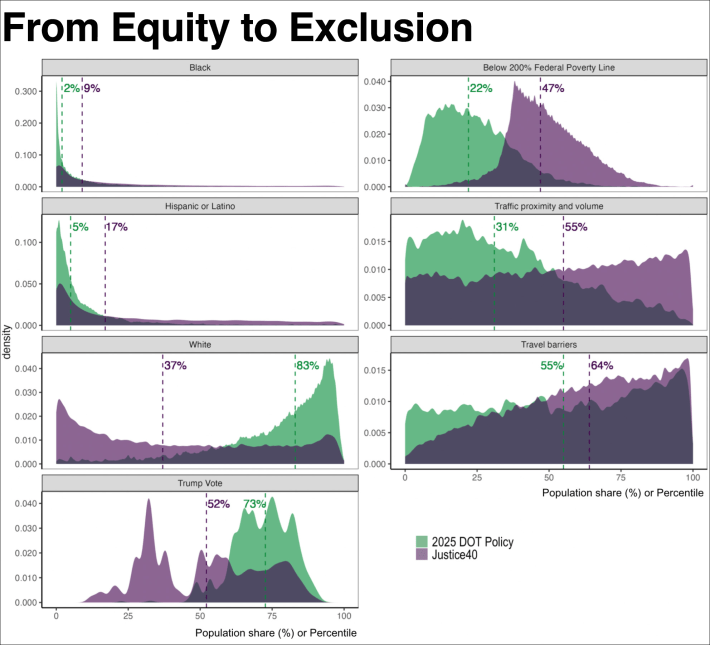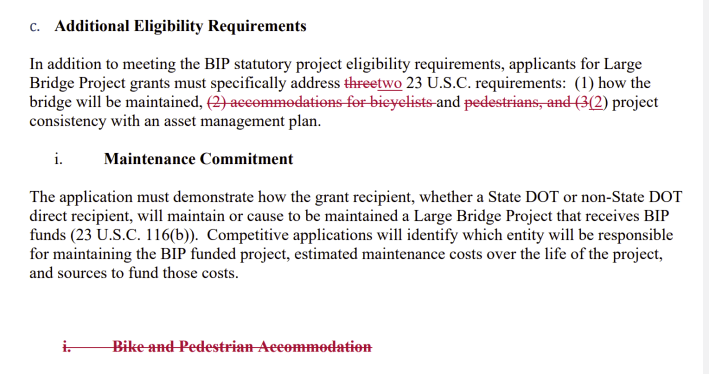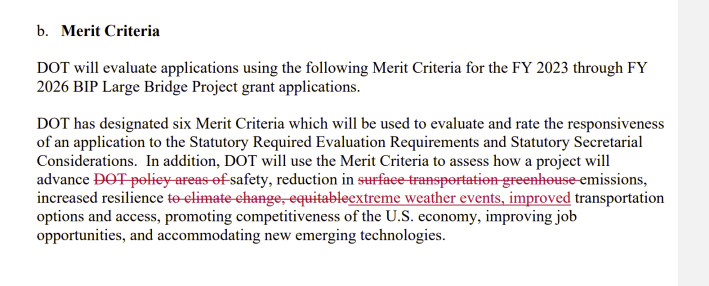Leave it to Sean Duffy to turn a simple grant announcement into another war on equity.
In an otherwise boilerplate announcement of $5.4 billion in federal funds for bridge repair, the U.S. Transportation Secretary also revealed that his agency would remove requirements to accommodate cyclists and pedestrians as well as what he (again!) called the "woke" and "Green New Scam" Biden-era rules to start the process of repairing decades of inequity in infrastructure.
Going forward, applicants for the Bridge Investment Program no longer have to include "an equity assessment which evaluates whether a project will create proportional impacts and remove transportation-related disparities."
Duffy has also taken out worker protections, removing language that forced applicants to "address how their project will create good-paying jobs with the free and fair choice to join a union [and to] focus on women, people of color, and others that are underrepresented in infrastructure jobs."
And he took aim at active transport, too, striking language from the program that sought to broaden "transportation modes such as pedestrian, bicyclist, and bus lanes."
Experts say taking out just these few words will cause irreparable harm to communities that have suffered from car dependence, such as Black neighborhoods cleaved by highways in the 1960s.
"Removal of this language and the requirement reflects not just an unfortunate shift in values, but a devastating outcome for the communities that have been unjustly burdened by the deleterious health effects of transportation pollution," said Daniel Horton, a Professor of Climate Sciences at Northwestern University, who studies the health impacts of global warming.
Duffy said the changes were needed because the Biden administration's attempt to improve equity and inclusion "handcuffed critical infrastructure funding requirements to woke DEI and Green New Scam initiatives that diverted resources from the Department’s core mission."
But some argue the changes represent a return to the racist, car-centric, backward planning of the past, where federal dollars purposefully bulldozed through Black and brown neighborhoods without accountability, another expert said.
"There is a clear shift towards prioritizing higher-income, whiter populations that voted more heavily for Trump," said Alex Karner, program director for Community & Regional Planning at the University of Texas at Austin, which recently analyzed the early part of the Trump U.S. DOT and concluded that its policy "shifts funding priorities towards white, Trump-voting areas and away from Black, Latino, and lower-resourced populations and those experiencing higher travel burdens and barriers."

Robert Cervero of the University of California-Berkeley also condemned Duffy for the DEI sideshow, which he said is an attempt to distract from America's very real transportation problems.
"Most bothersome [about the language change] is the shuttling of environmental justice considerations of transportation projects," said Cervero, an emeritus professor of City and Regional Planning. "Transport infrastructure, notably inner-city highways, often endanger the least-empowered residents the most ... High rates of asthma, bronchitis and other chronic respiratory diseases in areas abutting heavily trafficked corridors — especially among children — cannot be ignored. As long as the federal government funds a large portion of these projects, it has a moral and legal obligation to help mitigate them. This isn't 'DEI.' It's sound, responsible public policy-making."
The Biden administration included equity assessments as part of a larger effort to undo decades of infrastructure planning that has disproportionately resulted in residential displacement, pollution, traffic violence, and other harms to Black and brown communities.
Former Transportation Secretary Pete Buttigieg frequently spoke of how highway projects intentionally destroyed these neighborhoods.
Black and brown neighborhoods have been disproportionately divided by highway projects or left isolated by the lack of adequate transit and transportation resources.
— Pete Buttigieg (@PeteButtigieg) December 20, 2020
In the Biden-Harris administration, we will make righting these wrongs an imperative.
Duffy's latest changes follows Trump executive orders and social media posts that called for the removal equity requirements.
The secretary has readily complied. Last month, he cut $54 million in funding that had already been approved for research into making our sprawling transportation system more equitable — or as he put it, undertaking "a radical DEI and green agenda."
And in April, he threatened to withdraw all financial assistance to communities that promote "diversity, equity or inclusion" or refuse to comply with federal immigration orders.
Such clawbacks started nine days into the second Trump administration, when Duffy issued his famous "woke rescission" memo announcing the new administration's approach to transportation. (Biden had issued the mirror-image memo mere days into his administration in 2021.)
In the weeds
Duffy's change could lead to litigation because the language change in grant eligibility requirements conflicts with federal law.
For instance, the federal highway code requires bicyclist and pedestrian accommodations under many circumstances (though experts say that no administration has properly enforced it). But Duffy's new language no longer even pretends to require grant applicants to make "accommodations for bicycles and pedestrians," as the screenshot below shows:

And Duffy also expunged the requirements of references to climate change, preferring the Trump-era language of "extreme weather events."

The language change specifically applies to the Bridge Investment Program, but one expert cautioned that the U.S. DOT will continue to implement it across the board.
"It's important to rebuild bridges and safety connect people and places, but failing to consider impacts beyond the curbline is outdated planning logic," said Joe Harrington, executive director of Our Streets Minnesota.






